A Short Story
Because his home village back in the small district of Lundazi in the remote Eastern Province of Zambia in Africa had no telephones, faxes, electricity or let alone E-mail, Kamthibi could not communicate with his father and mother to tell them of his sudden urgent trip to the village to consult with them. The whole thing had happened so quickly. There was no warning. In his usual summer rat race, for the forty-two year old married professor with three children, he was teaching two courses, working in his beautiful vegetable garden in his back yard, mowing the lawn, writing a manuscript for book publication, getting involved with the children, worrying about cooking dinner, washing dishes, and sleeping late every night, and drinking six cups of black tea. The symptoms at first had been minor; stomach irritation, and feeling very sleepy during most of the afternoon. But suddenly one afternoon, things came to a head.
Kamthibi sat back in his lazy boy chair in the living room at four in the afternoon staring into space with an anguished look. He was so angry that he could not concentrate anymore. He could not write. His stomach was exploding with a burning sensation with a very tight knot just above his belly button. There was tension on the outside his my skull. He had no interest in music, drumming, sex with his wife, or smiling or laughing. In fact, it seems there was nothing to laugh at anymore. He was angry at the sickness, at himself, at failure of the best American medicine because he was used to a healthy, busy, active routine life style.
“Kamthibi honey,” his American wife Noreen said, “are you alright?”
Since they had first met in graduate school almost twenty years earlier and had gotten married four years later, she had never known a man who was so active every day. Kamthibi had to be doing something every single minute of the day. It was unusual for him to sit idly in his lazy boy staring into empty space even during the long lazy days of summer.
“I don’t know,” Kamthibi mumbled shrugging his shoulders.
“Honey,” Noreen gently placed her hand on her husband’s shoulder hovering over him. “You don’t look good. May be you should go to see the doctor.”
“Don’t touch me!” Kamthibi jerked forward in the chair. “Just for once don’t tell me what to do! Leave me alone!”
Noreen was so stunned. Her lower lip quivered. A tear dropped on her cheek as she walked into the bedroom and shut the door.
Kamthibi realized what he had done was so unusual he had to go and see the doctor again that week. He was feeling very lousy. In more than eighteen years of their marriage, he never yelled at her in all their fights. Kamthibi was the types of man that could not talk when he got angry or was having a heated argument with his wife. She always did the talking. In fact, Noreen often joked that she did most of the talking for both of them.
After he had apologized to his wife in the bedroom away from the children, Kamthibi agreed to see the family physician again for the second time that week. The family physician dropped the bomb shell. Kamthibi had classic symptoms of depression. He prescribed a strong anti-acid for his stomach and an anti-depressant. Kamthibi was shocked. Was he a depressed man? Knowledge of himself told him that he was not suicidal, anxious, or except for yelling at his wife once he was not experiencing uncontrollable temper tantrums. But he guessed he was depressed.
Kamthibi did not take the anti-depressants. He did not trust many prescriptions because he had some horrendous side effects from some of them. He wanted to find out what was really wrong first of all. His doctor referred to a lab for ten blood tests, more than a dozen urine tests, ultrasound of his gall bladder, all turned out negative. He took numerous types of vitamins, amino acids, and supposedly energy boosting health pills. All came to no good. It was time for him to go and see his parents in the village. Maybe traditional African herbal treatment would cure his illness.
 So it is that Kamthibi walked that mid-day in the bright African sun through the small path to the village carrying his small suitcase on his right shoulder. He was drenched in sweat. He had walked five dusty miles from the main road where the bus had dropped him. His feet were killing him and roasting his hot dusty gym shoes. Kamthibi was now in his last hundred yards. Two dogs began to bark usually the sign that strangers are approaching the village. He could have been in a scene in a movie. Children, presumably nieces and nephews, stood still staring at him. He spotted his mother near the small kitchen hut holding a pot from which she had just discarded some dirty water. The chickens immediately run to eat the wet morsels of bits of wet food. For a few split seconds, his mother looked at him with her dropped jaw in amazement.
So it is that Kamthibi walked that mid-day in the bright African sun through the small path to the village carrying his small suitcase on his right shoulder. He was drenched in sweat. He had walked five dusty miles from the main road where the bus had dropped him. His feet were killing him and roasting his hot dusty gym shoes. Kamthibi was now in his last hundred yards. Two dogs began to bark usually the sign that strangers are approaching the village. He could have been in a scene in a movie. Children, presumably nieces and nephews, stood still staring at him. He spotted his mother near the small kitchen hut holding a pot from which she had just discarded some dirty water. The chickens immediately run to eat the wet morsels of bits of wet food. For a few split seconds, his mother looked at him with her dropped jaw in amazement.
“Children!” she composed herself and yelled in his Tumbuka African language. “Why are you just standing there staring at your uncle? Don’t you recognize him? Come on, help your uncle with the suitcase. He is not dancing. He has walked a long way in the hot sun. Masozi! will you please get a chair for the guest to sit on, although it is old and creaks when you sit on.”
Kamthibi couldn’t help but smile. That was his vintage funny mother. It was as though he was ten years old again. The children sheepishly hustled over and relieved him of his suitcase and put it in his parent’s house. As he stood and wiped his sweaty brow waiting for the chair, Kamthibi saw the goats bleating, chickens with their chicks in tow, roosters chasing hens, pigeons singing in their coup, the mud houses, the nkhokwe food storage containers, a grass bathing shelter, the smell of smoke and open fire. All the sights and sounds of his childhood village life were comforting. He breathed a big sigh of relief as he plopped on the chair. His mother grabbed a reed mat and laid it down next to him. Then she walked towards him and half crouching and curtsying, they shook hands in the characteristic Zambian customary way of greeting. She sat down on the mat with her legs stretched out but crossed one on top of the other.
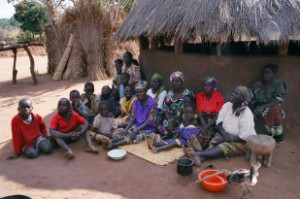 “Mister Tembo,” she began in the Tumbuka way of addressing to show respect. “Tell us how are you?”
“Mister Tembo,” she began in the Tumbuka way of addressing to show respect. “Tell us how are you?”
“Mother,” he said in Tumbuka. “Although I walk, eat, and work I have been ill for a long time.”
“Oh!!!” she shook her head. “I knew something or a guest was coming. I have not only had strange dreams lately, but today everybody else in the village is gone but I kept just being penned around the house finding one small thing to do after another.”
“Mother my malonje is very important and serious,” he said.
Malonje is a very important Tumbuka custom during which a guest gives a good systematic account about the purpose of the visit and in what condition the guest left their family and the host reciprocates by describing how he or she is doing including the entire family.
“You are right,” his mother said. “Something this important should wait until your father, brothers, and aunts come back in the evening. I don’t know why everybody had to go somewhere today leaving me an older woman alone. What if there was war? It would just be me and a few of your young nieces and nephews defending the entire village.” They all laughed.
Kamthibi briefly told his mother about his safe plane trip from Washington, D.C., to London, and Zambia’s Capital city of Lusaka. Then he caught a bus in Lusaka and travelled all night through the five hundred miles and was dropped off at the Hoya bus stop at nine that morning. He then walked the five miles to the village. He told her that his wife Noreen and the children were alright but were concerned about his ill health. Kamthibi’s mother consoled him saying life had difficult up and downs. She stood up to begin preparing lunch.
The children who were his nephews and nieces sat around him giggling as he made small talk with them. What grade were they in and did they know how to read and write. He gave some of them some simple arithmetic in subtraction, addition, and multiplication. They enjoyed the game. Who was their teacher? They were on school holiday that’s why they were at home on a week day.
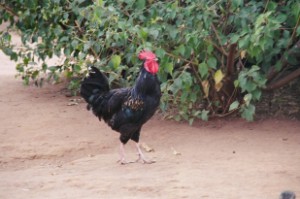 Shortly, his mother called the children and told them to chase and catch the black rooster. Kamthibi knew lunch was probably three hours away because the chicken was going to be caught, slaughtered, de-feathered, and cooked for at least an hour. Village chickens are very hard. But they are very tasty and have a rich flavor. He was served sweet potatoes and roasted peanuts which filled him up until lunch which was at about three in the afternoon. Time was already loosing its urgency. As according to custom, continuous streams of extended family relatives from his village, his mother’s village only two miles away, well wishers, and other villagers came to greet me all afternoon. News about a visitor from the city let alone one of their own who was a Professor from America gets around very quickly.
Shortly, his mother called the children and told them to chase and catch the black rooster. Kamthibi knew lunch was probably three hours away because the chicken was going to be caught, slaughtered, de-feathered, and cooked for at least an hour. Village chickens are very hard. But they are very tasty and have a rich flavor. He was served sweet potatoes and roasted peanuts which filled him up until lunch which was at about three in the afternoon. Time was already loosing its urgency. As according to custom, continuous streams of extended family relatives from his village, his mother’s village only two miles away, well wishers, and other villagers came to greet me all afternoon. News about a visitor from the city let alone one of their own who was a Professor from America gets around very quickly.
May be it was the excitement and adrenaline because at dusk, Kamthibi’s stomach did not really feel as bad. He thought to himself, ‘as usual there are bad days and good days for my ill stomach.’
Dinner was like in old times. His two younger brothers, now in their mid thirties, supervised the bringing of the wooden table outside on to the beautiful moonlight. Kamthibi’s father, his brothers and several pre adolescent and adolescent boys ate with them. His mother, her daughter -in-laws, female relatives, all the young girls and children ate near the hut kitchen within talking distance. The small dinner talk and eating the big delicious meal with chicken reminded him of his airplane meals. In comparison to the tinny stale meals served on the plane this was a large feast. Kamthibi joked aloud that if they were to serve our nshima staple meal enough to satisfy every passenger on the plane, the meal would have to be so big and heavy that the plane would not be able to take off the ground. Everybody had a hearty laugh.
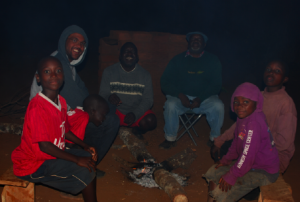 As dinner drew to a close, his father reminded everyone to put away the plates quickly so that they would conduct malonje for Kamthibi’s visit. Soon everyone sat around the fire with Kamthibi’s father on his left and mother on the far right. Malonje is a very special Tumbuka custom in which a guest explains not only the purpose of the visit but all the possible systematic detail so that the hosts or relatives will have a full account of what ever is going on in the visitor’s life and that of their family. As a child Kamthibi had sat through so many malonje of his older sisters sobbing and angrily returning from their marriages because they had quarreled with their husbands or because of some other persistent marital fights and problems. This time Kamthibi was the narrator of the malonje. It is quite a demanding task.
As dinner drew to a close, his father reminded everyone to put away the plates quickly so that they would conduct malonje for Kamthibi’s visit. Soon everyone sat around the fire with Kamthibi’s father on his left and mother on the far right. Malonje is a very special Tumbuka custom in which a guest explains not only the purpose of the visit but all the possible systematic detail so that the hosts or relatives will have a full account of what ever is going on in the visitor’s life and that of their family. As a child Kamthibi had sat through so many malonje of his older sisters sobbing and angrily returning from their marriages because they had quarreled with their husbands or because of some other persistent marital fights and problems. This time Kamthibi was the narrator of the malonje. It is quite a demanding task.
“Mr. Kamthibi Tembo, your mother and I, and virtually everyone else in the village are completely surprised by your trip,” Kamthibi’s father, in his usual calm deliberate voice said. “There had been no letter or any signal about your coming. Mwaticuruska, why are you startling us with such a sudden journey?”
“It all started eight years ago,” Kamthibi begun. “When I was working here in Zambia in the capital city teaching and doing research at the University of Zambia. One early morning, my stomach began to burn and I felt very noxious. A few days later, I had malaria fever. Meanwhile life in the capital was becoming extremely difficult. I had to drive my children to school, burglars were keeping my wife and I awake at night, I fetched scarce bread and cooking oil lining up in front of grocery stores for hours all day to buy these foods. Inflation was very bad. My pay as a professor could only buy one chicken and a loaf of bread and that was it. I was feeling very stressful. I had a tooth infection, ear infection, and bad reactions to antibiotics. My stomach continued to burn. The private doctors conducted dozens of tests but they could not find anything wrong.”
“My son, why didn’t you come home then?” his mother interjected. “We could have tried our African herbal medicines.”
“Mother, I nearly did. But I was too busy and besides I thought it was just stress at work. And that’s why I decided to immigrate to the United States since my wife is an American. When I arrived in the States, the symptoms disappeared just like that.”
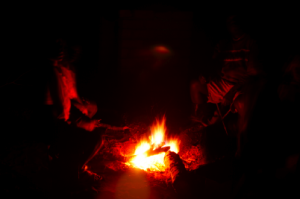 Kamthibi paused and stared into the flickering flames of fire and twirling smoke. His mother kept moving the one guilty smoking piece of firewood and shifting it so that the smoke momentarily twirled into a different direction away from her face. One of his nephews buried five large raw sweet potatoes under the red hot embers. This was no doubt a snack for later in the evening.
Kamthibi paused and stared into the flickering flames of fire and twirling smoke. His mother kept moving the one guilty smoking piece of firewood and shifting it so that the smoke momentarily twirled into a different direction away from her face. One of his nephews buried five large raw sweet potatoes under the red hot embers. This was no doubt a snack for later in the evening.
“As I lived and worked over the years,” Kamthibi continued. “My stomach burned and from time to time I felt tired, sleepy, and irritable. American doctors conducted dozens and dozens of modern tests and stomach x-rays again and again. My cholesterol was good, blood pressure was good, my glucose was good, my urine and stool tests were negative, all blood tests were negative. They could not find anything wrong.”
“Hmmm”, Kamthibi mother shook her head. “That’s why Western medicine is sometimes so ignorant. I remember thirty years ago I had an illness in which some thing, a pain, used to start from the small of my back.” She touched the small of her back moving her hand slowly behind her back. “It used to climb on my back like the way women carry babies and then it would move to my shoulder blade to my neck. I could not work or sleep for two months. In fact that was soon just after we had buried your younger brother. I went to a Western modern Chipata General Hospital and they couldn’t find anything wrong with me. They gave me only aspirins to kill the pain. It was finally our African medicine that worked. I purged incredible things.”
“This last illness that brought me here started in a most unusual way,” Kamthibi resumed. “I was working very hard teaching three courses. My wife was working during the day and also three hours every week night. I had signed a book contract and I was writing a manuscript. Many days I would come home and my wife was gone to work. I would cook, clean, feed the children, then I would work up to one in the morning. There was no time to talk to any one or do anything else. I don’t remember talking and laughing with any one. Sometimes I would get home and mow the lawn. Then one day news came from the college President that the enrollment of students had dropped and some Professors were going to be fired. I could be one of them since I was not tenured. I did not want to tell my wife.”
“Why?” his mother asked.
“I did not want to worry her and besides at this time our marriage was rocky. We were arguing all the time. Sometimes over nothing.”
“My son,” Kamthibi’s mother interjected. “This is how we women are. We are always bitching about this and about that. You would just have to live in this village for one day and you would see. We women are a troublesome sex. You men could build us a castle and we would still complain about something.”
Kamthibi’s father broke a knowing smile. Everybody laughed. His father was always the rational one. Growing up it was always so much more fun to be around his mother.
“Then one day, the school year ended. I had not been fired,” Kamthibi said. “ In spite all the problems I wanted to go and celebrate. Inviting my wife was probably a mistake. I drank a few beers and before we arrived home we were in an argument about nothing. When we went into the bedroom, she wanted to make noise watching TV in the bedroom and I wanted to sleep. I was so angry that I went and slept on the living room couch. The whole night I was angry at my marriage, at my job, at my life, and I even wondered if God existed. Then I thought about all of you here at home in the village. I was so lonely and for the first time in so many years tears flowed from my eyes. By the morning my stomach was burning like hell fire and there was a knot in it. I forced myself to eat. For the next four weeks, my stomach burned night and day. I was tired all the time and very irritable.”
“What did your wife think of all of this?” Kamthibi’s mother asked.
“She continued to argue with me over everything. Money, driving, children, my forgetting to buy milk, I was beginning to believe that she was possessed by something or evil spirited. How could she torture a sick husband in that way? I was working from sunrise to sunset but then because of my illness I could not concentrate at work. I even began to pray to God to help me.”
“Ah! ah! ah!” Kamthibi’s mother clapped her hands many times. “My son you suffered. Did anybody talk to your wife? May be her aunts or your mother-in-law?”
“Who would talk to her?” I asked. “In the American society, the two people in the marriage are supposed to solve their own problems. Relatives don’t want to be involved because of something they call privacy.”
“No, that’s wrong”, his mother was very emphatic. “Every man and woman needs Kulanga. Among our people kulanga means to criticize or rebuke as well to guide and advise. If you had brought your American wife here, I know she is a good mother, but we would langa her. We would have told her that when your husband is sick, or working too hard, give him space to breathe. He is not a horse or work ox. Even work animals need rest. Do not build a fire under his feet. If you were ill-treating her, the men in this village would langa you by telling you to respect your wife, the mother of your children. How do people survive in marriages in America when no one can give you any advice? Hah?”
“Those are Western ways”, Kamthibi’s father said rather weakly. “Some of our own Zambian couples in the cities live this way now.”
There was a long pause as his father stared into the flickering fire. Kamthibi knew his father had absorbed everything and he now was ready to say what he thought was wrong and the solution.
“My son,” his father said. “Your mother and I have been married for a long time. We raised together nine grown children. Some of them unfortunately God took away.”
“Maybe my son should just leave his wife in America and he can bring the children back here to the village.” Kamthibi’s mother interjected. “I will raise them even though I am old. Although I do not have bread, tea, sugar and American foods I will feed them nshima, the few pumpkins and peanuts that I grow. The children will go to our local village school. How did I raise you my son?”
“No, the mother of Nina,” Kamthibi’s father protested.
From as far as they could all remember Kamthibi’s father had always proudly addressed his mother by the third oldest sister’s name. This is an affectionate Zambian traditional custom.
“That’s not how to talk,” Kamthibi’s father said. “You are stirring up things unnecessarily. They have been married for sixteen years and they have three children. How is he just supposed to walk away from a marriage? You are creating confusion.”
“If she does not appreciate what he does, why should he suffer and die?” Kamthibi’s mother rebutted.
“Well,” his father said. “Let’s solve one problem at a time. I was saying we have been married for along time. Your mother is always talkative. When we were young in the marriage, I was always angry because I did not want her nagging me. Often I just left and went to the bar or rode my bicycle to visit friends. You have to get away sometimes. That’s what many men do. I know what is wrong with your stomach. We call it chamnthumbo in our language. It happens when a man or woman has too many angry nagging painful thoughts. That suffering and torment goes to the stomach and begins to stir it up. Tomorrow early in the morning, I will go to the bush with you. I will show you the trees and herbs. In case I die I want you to know the trees so that you can treat others and yourself with the same herbs in the future if they ever get ill.”
Afterwards, every body joined in free flow spontaneous conversation. They ate the sweet potatoes. They talked about the weather and what all the different siblings were doing. What grades Kamthibi’s children were in and how they wished the children had come with him to visit everyone in the village. Kamthibi told them how his two older boys had been playing soccer, American football, and basketball. Kamthibi explained what American football and basketball were.
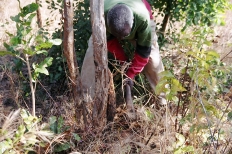 Early the following morning, Kamthibi and his father headed for the bush. His father showed him the tree first and its name. Then he either dug the roots or get the leaves or both. Kamthibi helped his father dig. He did this for six different trees.
Early the following morning, Kamthibi and his father headed for the bush. His father showed him the tree first and its name. Then he either dug the roots or get the leaves or both. Kamthibi helped his father dig. He did this for six different trees.
Once they returned to the village, the preparation of the herbs and especially the some of the rituals surrounding their use were very complex. He soaked some of the roots. Kamthibi was to drink the herb twice per day. Some of it was strictly supposed to be cooked with food. Some roots were burned and the dark charcoal was ground and used in scarification around Kamthibi’s feet, hands, stomach, and his temple. His father administered this.
Some of the leaves were to be pounded into a mash with a pestle and mortar. They were then soaked in a large container. Kamthibi’s mother was to wash or rinse his face with this herb at the edge of the village once at the beginning of the treatment only.
The first night Kamthibi had a lot of discomfort and sweating. The following morning he had the worst diarrhea of his life. He was in the out house all morning and feeling really weak and dizzy. He may have been dehydrating. His father said that was a good sign as Kamthibi’s body was being cleansed of what ever was the problem with his stomach. His mother was then instructed, according to the treatment requirements, to cook a small very hard nshima which is the Zambian staple meal cooked with corn meal. After he ate this he felt much better.
That night Kamthibi had some of the most vivid dreams. He dreamt that his he and his wife Noreen lived in a large bungalow in a neighborhood they lived in when he was doing his graduate studies. Their two little children were playing in the sand box. Their house suddenly caught fire starting from the basement. Kamthibi had to call Nine One One. He run to the neighbors and they did not have a phone. One of them said in a slow motion voice that his phone had just been disconnected. Meanwhile their house was now engulfed in flames. Kamthibi cried and cried helplessly. He grabbed his two children and run to see if he could get help. Suddenly his uncle from Zambia in Africa appeared driving a silver car. Kamthibi told him about their house being on fire. His uncle consoled him. Kamthibi sobbed as he wondered how he was going to break the terrible news to his wife when she came back from work that night? When Kamthibi returned to the house it was smoldering in ashes and two very old fire trucks from the nineteen thirties showed up. His wife said she had already seen their house burning on TV on the local nightly news at her work. Kamthibi woke up.
On the third day, he was told to stop taking some of the herbs. But Kamthibi was told to continue others for the next three weeks. After that, there was a ritual during which the disease is sealed away never to return to his body. (See The Role of Chizimba in Healing)
At edge of the village in the bushes, Kamthibi sat on a goat skin stool facing away from the village into the wilderness. He then knelt down and leaned forward and removed his shirt. As everybody in the village watched, his mother’s sister rinsed Kamthibi’s head with some of the herbs he had been using. She then shaved his hair. She collected the hair and all the left over herbs Kamthibi had been using into a large basin. She twirled the container around Kamthibi’s head several times while chanting “Never come back! Never come back! Never come back!” After this, Kamthibi was told to look the other way while his aunt walked away into the bush to bury the material in a deep hole.
Kamthibi was in good health again. The following week, amidst laughter and high spirits, Kamthibi bid everyone farewell. He traveled back to the capital city of Lusaka. He flew to New York and resumed his teaching at the college. Kamthibi’s stomach has not troubled him since. Maybe it was because he was gone for over six weeks. Kamthibi’s work and marriage seemed to be in a much better shape.